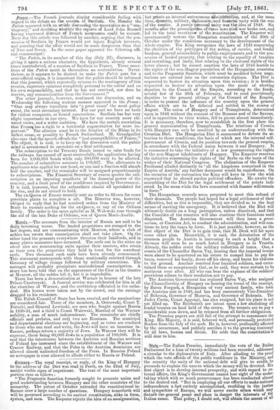ftnnatni.—The royal rescript, or reply, of the King of Hungary
to the address of the Diet was read in Pesth, on the 22nd of July, amidst visible signs of impatience. The text of the most important portion runs as follows :
"The Pragmatic Sanction formerly sought to promote union and good understanding between Hungary and the other countries of the monarchy. The patent of October extended the constitutional in- fluence over a large number of questions. Hungary henceforth will will be governed according to its ancient constitution, alike in form, system, and men. The Emperor rejects the idea of an amalgamation,
but grants an internal autonomous administration, and, at the same time, dynastic, military, diplomatic, and financial unity with the rest of the empire. A purely personal unity was the idea of 1848. Six months after the promulgation of these laws civil war broke out, and led to the total overthrow of the constitution. The Emperor will spontaneously restore the Hungarian constitution of the 20th of October under the conditions necessary to the development of the whole empire. The King recognizes the laws of 1848 concerni,nn. the abolition of the privileges of the nobles, of conies, and feudal burdens, general admissibility to public employments and to the pos- session of landed property, that relating to the equality of taxation and recruiting, and lastly, that relating to the electoral rights of the lower classes ; but he caunot sanction the laws of 1848 hostile to the rights of the non-Magyar population of the Hungarian countries and to the Pragmatic Sanction, which must be modified before nego- tiations are entered into on the coronation diploma. The Diet is requested to bestow its attention upon this revision ; it is besides requested to bestow its attention upon the mode of electing deputies to the Council of the Empire, according to the funda- mental law of the 26th of February, and to send provisionally deputies to the present sittings of the Council of the Empire, in order to protect the influence of the country upon the general affairs which are to be debated and settled in the course of August. The union of Hungary and of Transylvania, determined upon in 1848 without the consent of the Romans and of the Saxons, and in opposition to their wishes, fell to pieces almost immediately. It is necessary, therefore, now to reestablish in the first place the general representation of Transylvania. The relations of Croatia with Hungary can only be resolved by an understanding with the Croatian Diet. The Hungarian Diet is summoned to devote its at- tention to those conditions, the basis of which are the internal self- government of Croatia, and its position towards the general empire, in accordance with the Federal union between it and Hungary. It is summoned to take the initiative of a law guaranteeing the rights of the non-Magyar inhabitants of Hungary. The Emperor reserves the initiative concerning the rights of the Serbs on the basis of the wishes of their National Congress. The abdication of the Emperor Ferdinand alluded distinctly to all the kingdoms comprised in the Empire of Austria,' any further document would be superfluous. On the occasion of the coronation the King will keep in view the wish expressed that he should pardon political offenders. He awaits the assembling of the Diet for the legal settlement of the points indi- cated. In the mean while the laws connected with finance will remain in force."
The Hungarians scarcely seem prepared to meet this refusal of their demands. The people had hoped for a legal settlement of their difficulties, but as this is impossible, they are divided as to the best means of meeting the emergency. It is believed that the Diet will ultimately decide on a long prorogation, unless dissolved, and that the Comitats of the counties will also continue their functions until dispersed. The Austrian Government will then issue a provi- soraum, or Coercion Act, to conduct the administration, and will con- tinue to levy the taxes by force. It is just possible, however, as the first object of the Diet is to gain time, that M. Deak will hit upon some other plan. Meanwhile, it is said, the detestation of the common people to Austria is increasing to such a height that a German will soon be as much hated in Hungary as in Venetia. Already, the nobles resist the military collection of taxes. One, a cousin of the Chancellor Baron Vay, hearing that the imperial troops were about to be quartered on his estate to compel him to pay his taxes, removed his family, drove off his sheep, and burnt his chateau to the ground. Another received four hundred soldiers, and enter- tained them so sumptuously that, as he said, they were certain to be mutinous ever after. All who can bear the expense of the soldiers' provisions adhere to their resolution not to pay. The Austrian Government has replaced Baron Vay, who resigned the Chancellorship of Hungary on hearing the terms of the rescript by Baron Forgach, a Hungarian of very ancient family, who took the Austrian side in 1848, and has been successively Vice-President of Bohemia, Governor of Moravia, and Governor of Bohemia. The Judea Cathie, Count Apponyi, has also resigned, but his place is not yet filled up. The Reichsrath are intent upon a law abolishing all feudal tenures on land held of the crown. The tenants are to pay a considerable sum down, and be released from all further obligations.
The Prussian papers are still full of the attempt to assassinate the King. His Majesty, it is said, behaved well, and personally protected Becker from the futy of the mob. He is, however, profoundly affected by the occurrence, and publicly ascribes it to the growing contempt for all laws, human and divine. He adds that the constitution IS still dear to him.






























 Previous page
Previous page